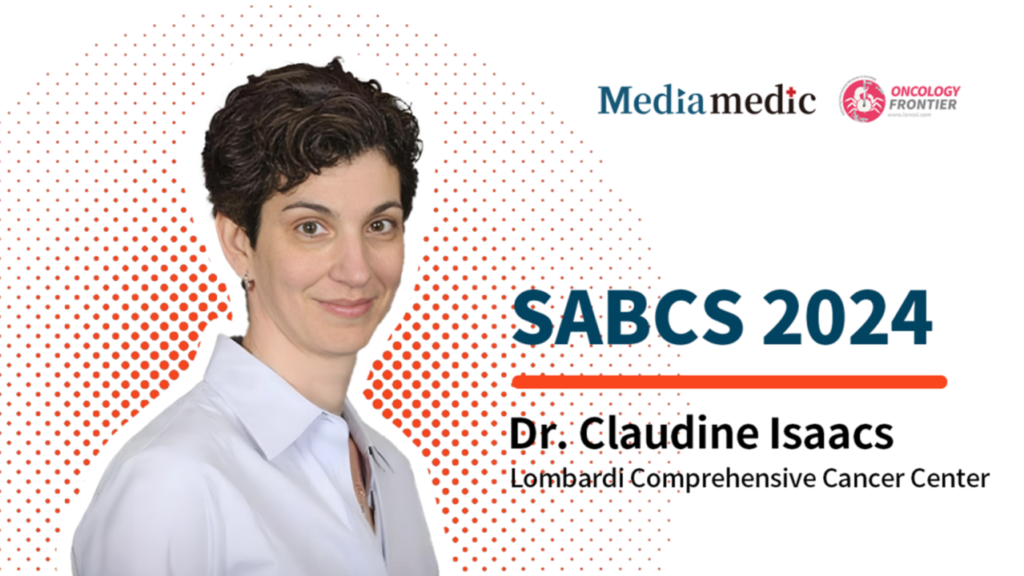
Editor's Note: Pathogenic germline mutations in certain genes are known to increase the risk of hereditary breast cancer. Approximately 5% to 10% of all breast cancer cases are hereditary, primarily driven by such mutations, with BRCA1/2 being the most common. Germline mutations also guide treatment decisions, as patients with pathogenic BRCA1/2 germline mutations may benefit from PARP inhibitor-based therapies.On Thursday, December 12, from 12:30 to 1:45 PM (CST), an expert panel at the 2024 San Antonio Breast Cancer Symposium (SABCS) discussed new data on the classification of BRCA2 germline variants, advancements in risk prediction models, and the therapeutic implications of BRCA1/2 reversion mutations during the session “Risk Reduction and Early Detection: The Future of Cancer Genetics.”
- Dr. Claudine Isaacs, MD, professor of medicine and oncology, and clinical breast cancer program leader at Georgetown University’s Lombardi Comprehensive Cancer Center, moderated the session. She emphasized the importance and timeliness of addressing hereditary breast cancer risk.
Personalized Medicine in Cancer Genetics
Dr. Isaacs highlighted, “Across all areas of medicine, we are increasingly recognizing that personalized treatment, prevention, and screening strategies are essential to delivering on the promise of precision medicine.”
- Fergus Couch, PhD, professor and chair of laboratory medicine and pathology at Mayo Clinic Rochester, discussed the functional and clinical classification of variants of uncertain significance (VUSs) in BRCA2 using saturation genome editing.
- Dr. Couch explained, “Clinicians engage with patients to discuss genetic testing, interpret results, and assess risk based on findings. Often, testing for familial or hereditary cancer susceptibility genes like BRCA1/2 yields variants of uncertain significance. While most VUSs are eventually reclassified as benign, meaning they pose no clinical impact, some are categorized as moderate or high-risk.” She added that interpreting VUSs is a significant challenge in clinical practice.
- “Dr. Couch and her team’s timely work to determine the clinical relevance of VUSs is critical for risk assessment, treatment decisions, and discussions with patients regarding prevention or monitoring strategies,” Dr. Isaacs noted.
Advancements in Risk Prediction Models
- Antonis C. Antoniou, PhD, professor of cancer risk prediction at the University of Cambridge’s Centre for Cancer Genetic Epidemiology, presented updates on risk prediction models.
- Dr. Isaacs explained, “The focus of this presentation is achieving greater individualization in breast cancer risk prediction to inform tailored cancer screening and prevention strategies. Dr. Antoniou highlighted a risk prediction model that incorporates not only genetic risk from breast cancer susceptibility genes but also polygenic risk scores. Notably, this model is applicable across diverse racial and ethnic populations.”
Therapeutic Implications of BRCA1/2 Reversion Mutations
- Katherine Nathanson, MD, Pearl Basser Professor of BRCA-Related Research and deputy director of the Abramson Cancer Center at the University of Pennsylvania, explored the impact of BRCA1/2 reversion mutations on treatment response and the role of genetic testing in shaping therapeutic approaches.
- Dr. Isaacs commented, “Many patients with germline BRCA1/2 mutations, and in some cases PALB2 mutations, have targeted treatment options in both metastatic and early-stage settings. However, resistance mechanisms can emerge. Understanding these mechanisms and their associated genetic changes can guide the development of novel therapeutic agents.”
Multidisciplinary Insights and Patient Advocacy
- The session concluded with a panel discussion featuring the presenters, Dr. Isaacs, and patient advocate Tanja Spanic from the European Women’s Cancer Alliance in Slovenia.
- Dr. Isaacs reflected, “The topics covered in this session transcend individual disciplines. The content’s clinical relevance makes it applicable to a broad range of experts, including advanced practice providers, nurses, genetic counselors, medical/surgical/radiation oncologists, and breast imaging specialists.”
- She also noted that the session offered valuable insights for basic and translational researchers, as well as epidemiologists seeking to understand hereditary risk and its treatment implications.
“We now have the tools for precision medicine,” Dr. Isaacs concluded. “If we don’t conduct genetic testing, we miss opportunities to treat patients in the most optimal way. This session underscores not only the importance of testing but also how to integrate these findings into more personalized approaches to patient care.”


